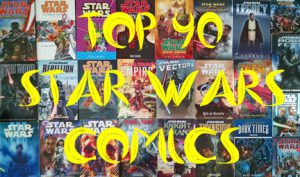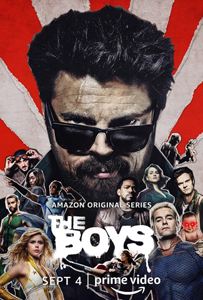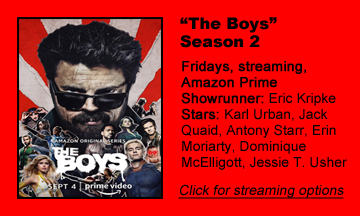It’s been said that Washington, D.C., is Hollywood for ugly people, but we mostly view politics and celebrity culture as two distinct categories. What’s smart and fun about Amazon Prime’s “The Boys” – which recently released the first three episodes of Season 2, with episodes 4-8 coming out on Fridays – is that it mashes politics and celebrity into one thing via The Seven.
Skewering superhero standards
As Season 2 begins with three intellectually rich hours, it’s clear that “The Boys” isn’t so much a satire of the superhero genre as it is a show that maximizes the superhero format to tell a gray-area story rather than getting caught up on whether a person is either Good or Evil.
(Don’t get me wrong, the extremes are represented too: Homelander is Evil AF, and I think it’s safe to use Hughie as a moral compass.)
“The Boys” is a satire, too, but it’s a satire of image creation, marketing and public relations. I’m now used to the idea that The Seven are both superheroes and celebrities who are primarily known to their fans through careful marketing. Newcomer Stormfront (Aya Cash) livestreams her time with The Seven.
And marketing head Ashley (Colby Minifie) leads a focus group to decide between “Saving America” or “Saving the World,” and “superheroes” or “supervillains.” This might be the best part of “The Boys,” and therefore the most underexplored part.
“The Boys” also pokes fun at certain big superhero franchises (in which image and marketing play a big role, of course), if you want to see it that way. In the most pointed sequence of these three episodes, a movie writer goes through his “The Seven” screenplay with members of The Seven, describing an epic final scene where the team is formed, leading up to a sweeping Hans Zimmer score.
Then Stormfront points out that all the writer’s female superheroes remain “unknowable Hitchcock bitches” or “Michael Bay f***-dolls.”
Girls get it done …
And on the small screen, the three women (Stormfront, Erin Moriarty’s Starlight and Dominique McElligott’s Queen Maeve) star in the reality show “Girls Get It Done.”
Behind the scenes of interviews – in which they are told what to say – we see that they don’t buy into the idea of females’ existence being an exciting new discovery; indeed, Stormfront goes off on a rant about how competence is what matters — it’s not a competition between genders.
The “Girls Get It Done” stuff calls to mind Entertainment Weekly’s obsession last decade with characters like Wonder Woman or Captain Marvel breaking a rebuilt glass ceiling, totally ignoring all the female superheroes that came before so it can pitch a false newness.
When The Seven does these media blitzes – Starlight decked out in the sexy version of her costume that she rejected last season and now exclusively wears (a way to get eyeballs, or a satire of the way to get eyeballs? Discuss) – it’s the vibrant and statement-making part of the show.

… and so do The Boys
But it is called “The Boys,” not “The Seven,” and showrunner Eric Kripke and his team don’t lose sight of who the true heroes are. As in reality, it’s not carefully cultivated politician-celebrities, it’s guys living in squalor, hiding from the law, and having no power to overcome a smear job.
In a “nice to visit, wouldn’t want to live there” way, I do like The Boys’ basement lair under a mom-and-pop store, where Hughie (Jack Quaid) sleeps on a cot in a storage room and “showers” at a sink. This contrasts with his girlfriend (ex-girlfriend?) Starlight’s posh pad in the Vought tower.
The titular Boys – led by Billy Butcher (the great Karl Urban, “Dredd”), who regularly refers to people as various terms for female genitalia — are protecting a “terrorist” (Abraham Lim’s Kenji), and the bad guys are globally beloved superheroes.
OK, I admit that “The Boys” doesn’t totally eschew those old Good-Evil explorations. These episodes sometimes fall back on familiar territory when Hughie wonders if Butcher has gone too far (he’s willing to sacrifice others in his quest to find his wife).
But it goes about it in not-so-obvious ways. Stormfront made an early bid for being my new favorite character with her sharp observation that “people confuse nice with good” as she encourages squeaky-clean Starlight to go ahead and be a bitch if she feels like it.
As Stormfront exposes some of the unpolished inner workings of Vought and The Seven on her livestream, I thought she might be out to – as the hopeful cliché goes – change things from the inside.
Image is everything
As it turns out in episode three, Stormfront isn’t such a revolutionary; she ends up challenging even Homelander (Antony Starr) at the game of looking out for number one.
(That makes Homelander hate her, because she might be as evil – and just as talented at faking being good – as he is. And Homelander sets a high bar, as he’s currently living with the woman he raped and co-raising their son, holding the continued safety of her husband, Billy, as a chip.)
I’m on the fence about whether Stormfront’s viciousness is a nice twist or a writing cheat, but still, she won’t be confused with a Hitchcock or Bay creation. And at least there are no arcs about someone slowly being poisoned by power. Or if there are (Starlight? Say it ain’t so), they are understated.
Along with Cash, another welcome newcomer is “Breaking Bad’s” Giancarlo Esposito as Vought head Stan Edgar. Instead of smoothing out the workings of a secret meth empire, here he’s on TV news smoothing out the company’s public image, nicked by the leak that superpowered people were created by Vought’s Compound-V rather than being born with powers by random chance.
Boardroom meetings show that Vought is concerned about perception, legal troubles, stock prices, etc., but “The Boys” makes a viewer think about how easily a big corporation or a political body (on this show, the line between those two entities is blurred) can smooth things over.
Edgar simply announces that he knew nothing about Compound-V and that it comes from a rogue splinter group within the company that will be rooted out.
A hazy world
Meanwhile, recovery from mistakes is not so easy for individuals. Deep (Chace Crawford) has earned my sympathy since his Season 1 sexual harassment of Starlight because I’ve learned his rudeness stems from self-confidence issues about his gills (voiced by Patton Oswalt).
But Starlight still hates his guts and The Seven (technically The Six, without him) aren’t ready to take him back.
By showing us superheroes being unjust, and their hated adversaries pursuing true justice, Season 2 reminds us that the world is not so clear-cut. If you can never really know an individual, how can you know a powerful body with a full-time PR team behind it?
“The Boys” – with “Watchmen” in a strong second place – stands as the best superhero show of recent years because it’s totally about superheroes (with a straight face) but it doesn’t define them by their names, costumes and catchphrases.


